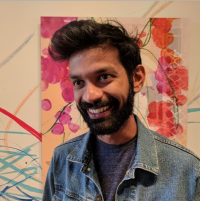May 8, 2019
“Activist Engineering”
Posted by Sharon Rauch
 Career arc: Darshan Karwat loved rockets and space for as long as he can remember. After moving to the U.S. from India, Karwat earned both a BSE and Ph.D. in Aerospace Engineering at the University of Michigan, Ann Arbor. While in school, he found himself asking questions about sustainability, social justice and the responsibilities of scientists and engineers in addressing big societal challenges like climate change. Some of those questions even found their way into his doctoral thesis, which focused on the combustion chemistry of biofuels and also examined how climate change factors into engineers’ perceptions of their own work.
Career arc: Darshan Karwat loved rockets and space for as long as he can remember. After moving to the U.S. from India, Karwat earned both a BSE and Ph.D. in Aerospace Engineering at the University of Michigan, Ann Arbor. While in school, he found himself asking questions about sustainability, social justice and the responsibilities of scientists and engineers in addressing big societal challenges like climate change. Some of those questions even found their way into his doctoral thesis, which focused on the combustion chemistry of biofuels and also examined how climate change factors into engineers’ perceptions of their own work.
Karwat applied for a slew of postdoctoral and faculty positions, but when no offers materialized, he took to the road, formulating his next steps while traveling around the world. After a year, he landed an American Association for the Advancement of Science (AAAS) policy fellowship, through which he served stints at the U.S. Environmental Protection Agency and Department of Energy.
In the fellowship, he found an environment that encouraged an approach to engineering that puts the societal context of scientific, engineering, and environmental challenges first and foremost, and in which the space of possible contributors to addressing technical challenges is expanded. He was hooked.
“I’m really glad I didn’t get any of the jobs I applied to, because that led me to the AAAS fellowship. It was the perfect opportunity for me to experience how technically trained people can do work with significant social and policy implications.”
Rather than trying to fit into a traditional aerospace engineering career—like a square peg in a round hole—Karwat saw the possibility of a different sort of career. It was an easy sell when he was offered a position at Arizona State University’s School for the Innovation in Society and The Polytechnic School, organizations trying out a radical new model for multidisciplinary work that’s focused, above all, on social impact.
Motivation: Karwat advocates for what he calls “activist engineering.” While engineers today incorporate social and environmental considerations far more than they would have in decades past, he wants to see more engineers focusing on ways they can directly apply their skills to center those most marginalized in society and on Earth—not just working to improve quarterly profit reports.
“How can engineers identify social, political, and ecological problems differently, and apply their skills to solving those problems, rather than ones that are just handed to them in organizations that are motivated by efficiency and profit?”
How I see community science: Gaining traction, but still a long way to go. Karwat says he encounters a lot of engineers who want to work with communities and address big societal issues. But most can’t find a way to do that as an integral part of their day jobs. Instead, they do it on the side—if they do it at all.
“A lot of people who are doing amazing community work are not doing it for any professional gain. They’re doing it because they feel it needs to be done. There are a bunch of barriers related to valuing such work. We must recognize that this work is rigorous technically and scientifically. Our motivations may be different, but it’s no less rigorous.”
Looking ahead: Karwat sees a big need for experimentation to find ways for scientists and engineers to address societal needs within, rather than outside of, their day jobs. Despite the barriers, he’s hopeful that things are heading in the right direction.
“It is really helpful that groups like AGU and AAAS are working on developing formalized structures within which this work can be done and get appropriate recognition for this kind of work. There is a latent dissatisfaction on the part of a lot of engineers related to their wanting to do this kind of work but not being able to do it. We need people at all levels in all types of organizations pushing to change the incentive and organizational structures of science and engineering to allow more of this work to happen.”
Darshan Karwat, Ph.D., Assistant Professor, School for the Future of Innovation in Society & The Polytechnic School, Arizona State University


 On the Job is an AGU blog, that provides career advice and workforce guidance to geoscience students, early-career and established professionals who are interested in pursuing professional enrichment.
On the Job is an AGU blog, that provides career advice and workforce guidance to geoscience students, early-career and established professionals who are interested in pursuing professional enrichment.